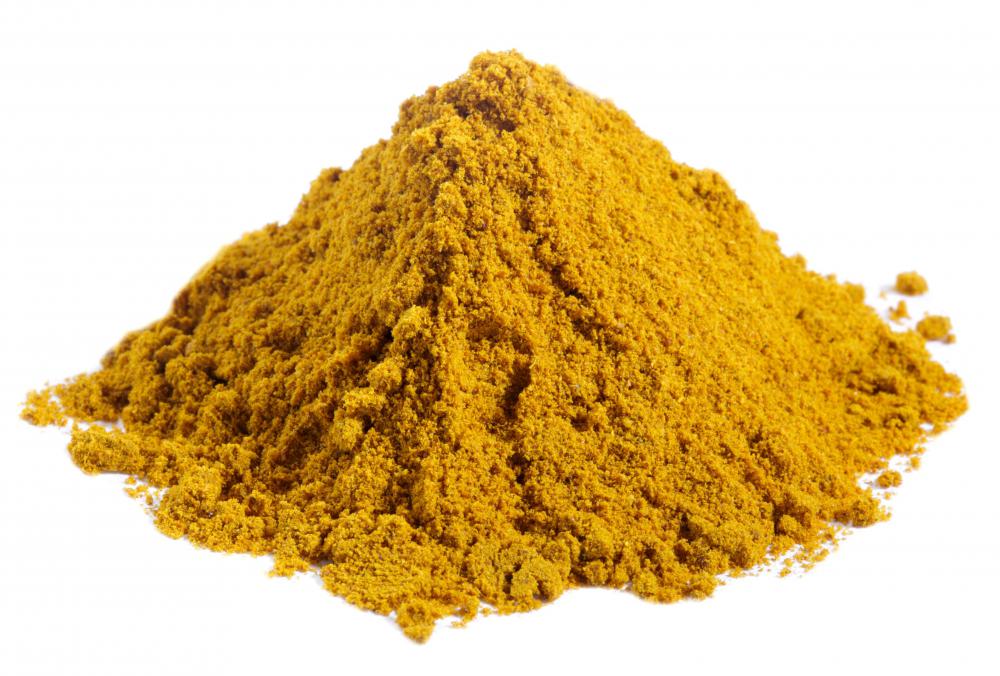At WiseGEEK, we're committed to delivering accurate, trustworthy information. Our expert-authored content is rigorously fact-checked and sourced from credible authorities. Discover how we uphold the highest standards in providing you with reliable knowledge.
What are the Benefits of Turmeric As an Anti-Inflammatory?
There are several benefits to using turmeric as an anti-inflammatory. The main benefit is price; turmeric is generally very cheap. Of secondary, but possibly equal, importance is its ease of availability. It is a common spice that can be manufactured and sold easily, even when packaged for medicinal use. Turmeric also has very few side effects, so it can be used a long time without harm to the body, except perhaps in a few sensitive individuals. It has also been found to be a potent anti-inflammatory.
Turmeric, or Curcuma Longa, is a relative of ginger. It is a long plant that is covered by a fibrous brown skin and grows up to 6 feet (about 1.8 meters) in height. The orange-yellow hue of its innards is what gives some mustards and curries their distinctive coloring and flavor. The active ingredient in turmeric is largely considered to be curcumin. In addition to having anti-inflammatory properties, curcumin also has a strong antioxidant effect.

The use of turmeric as an anti-inflammatory goes back several thousand years. It is primarily associated with India, as that is where most of it is grown, but it is also used in China for the same purpose. Ayurvedic medicine, the traditional medicine of India, has used turmeric for thousands of years for a variety of anti-inflammatory diseases and other illnesses.

Most of the studies that have been done to check for the validity of turmeric as an anti-inflammatory, at least among Western studies, have been done with animals. As there have been positive results, more recently studies have been done on humans. Most have found that turmeric is an effective anti-inflammatory but also suggested that concentrated forms of the active ingredient curcumin are more effective.

Turmeric has been found to treat several diseases that are inflammatory in nature. Studies have suggested that it can help with inflammatory bowel disease, osteoarthritis and rheumatoid arthritis. It has been found to be comparable to some prescription anti-inflammatory medications as well as some over-the-counter drugs. Unlike those medications, turmeric does not seem to have significant side effects.
Despite the overall safety of using turmeric as an anti-inflammatory, at least when taken in its suggested dosage, it is not recommended for those with certain diseases, such as stomach ulcers. It is recommended to talk to a doctor if you have diabetes or gall bladder issues before taking turmeric. Women who are pregnant are recommended to refrain from taking supplemental strength turmeric, though using it as a spice is fine. There are several drugs that turmeric can interact with, so it is always recommended to check with a doctor when taking it with other medications.
AS FEATURED ON:
AS FEATURED ON:













Discussion Comments
This is such an interesting article and the comments are very helpful as well.
Does turmeric have anti-viral properties as well? I remember reading somewhere that it is also an anti-viral and an anti-bacterial. If that's the case, that may be one more reason why turmeric works as an anti-inflammatory. Viruses and bacteria lead to inflammation because the immune system has to send white blood cells to fight them. If turmeric helps kill viruses and bacteria, naturally, inflammation will be reduced or will not even develop.
@stoneMason-- Wow, I didn't know that turmeric is effective against cancer as well. Are there any studies that have proven this connection?
I know that turmeric has anti-inflammatory properties because I use it for acne. It was recommended to me by my friend who is Indian. I use turmeric as a mask on my face when my acne acts up. I just mix dry turmeric powder with a little bit of water to make a mask. I apply it all over my face and wash it off when it's completely dry.
I immediately notice a difference when I use this mask. The swelling goes down, my acne spots become less red and they dry out within a few hours. It's quite amazing actually. It does leave my skin a little orange though, so I only use it on weekends.
Inflammation is very common with cancer, and turmeric is recommended for cancer patients. Turmeric not only fights inflammation, but it is also believed to prevent cancer when used regularly. I believe in this and add a few pinches of turmeric to everything I cook.
Post your comments